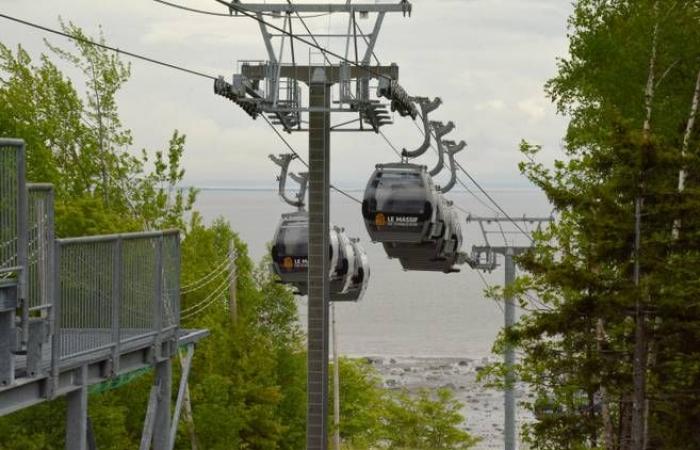Since 2007, the Quebec and Canadian governments have allocated $198,882,547 to the Groupe Le Massif and the various entities that make up the recreational tourism project.
According to access to information requests sent to six different government departments and agencies, the Quebec government paid $147,562,339 to the ski centre, the tourist train and the accommodation complex.
Major investments began in 2007, with Investissement Québec investing $25 million in equity in the project. The Crown corporation then provided a $10 million loan in 2010, and increased its stake in the project by $12 million in 2011 and 2017.
For its part, from 2007 to 2021, the Ministry of Economy, Innovation and Energy granted $55,225,000 in various forms of loans and grants. $21 million was granted to Groupe Le Massif to support the Club Med de Charlevoix project.
The Ministry of Transportation and Sustainable Mobility has granted grants and loans totaling $12 million, the vast majority to support the Train de Charlevoix and the Chemin de fer Charlevoix.
The Ministry of Municipal Affairs and Housing also funded the recreational tourism project for a total amount of just over $22 million. For its part, the Ministry of Tourism granted nearly $11 million.
The Canadian government has reportedly granted a total of $51 million to the Massif and various organizations linked to it. The federal government has allocated nearly $30 million in 2008, $10 million when Club Med arrived, and various amounts to support the tourist train.
A business model…
While conceding that the amounts “are indecent,” Renaud Brossard, vice-president of communications at the Montreal Economic Institute (MEI), is not surprised by the $200 million figure. According to him, the Quebec government has adopted this strategy for a long time: subsidizing large projects in order to attract investors and reduce their risks, without having any certainty about the benefits.
“Are these subsidies worth it? It’s always very clear, the answer is no. When the government presents us with subsidy projects, we have to realize that the forecasts for jobs and spinoffs are quite rosy and do not always materialize,” says Mr. Brossard.
“The Quebec government does not have a very good track record as an investor. We can think of the Gaspésia project, Ciment McInnis, the Plan Nord or even Bombardier’s C-Series. We will see what happens in a few years with Northvolt, but I am not very optimistic at that level.”
— Renaud Brossard, Vice-President of Communications at the Montreal Economic Institute (MEI)
He points out that “the government never makes calculations to find out about the opposite scenario: if it had not been subsidized, would the project have taken place anyway?”
Étienne Charbonneau, a professor at the École nationale d’administration publique (ENAP), says that this habit of subsidizing large companies “has become the business model” of the Quebec government. The support given to Ubisoft and the video game industry – which is currently experiencing difficulties – is another example, according to him.
…without guarantees
Like Mr. Brossard, he deplores the fact that this funding is often granted “without knowing what the real benefits will be.”
Asked about this, the Ministry of Economy told the Soleil “not having carried out internal studies to quantify the economic benefits linked to the Massif de Charlevoix”.
For its part, the Ministry of Tourism responded that it “holds certain information relating to the economic benefits” of the project, but that these “are the property of the Massif de Charlevoix.”
“It is therefore not possible for us to disclose the requested information,” the ministry added.
Guillaume Tremblay-Boily, a researcher at the Institute for Socioeconomic Research and Information (IRIS), confirms that “it is a common practice”: the government subsidizes most of the time without evaluating “itself or independently” the benefits of the investments. He argues that the government should demand more transparency before financing such projects.
Invest elsewhere
According to the vice-president of communications at the MEI, the Quebec government would benefit from “lightening the tax burden” on large companies in order to encourage them to invest here, instead of attracting them with loans and subsidies.
“It’s not just a question of taxes. The return on investment is directly affected by regulations, because the longer it takes, the more expensive it is to develop a project. So the government would benefit from creating a more attractive business environment without always having to subsidize,” suggests Mr. Brossard.
He adds that the 200 million could have been invested in the province’s health or education services.
While opposing the idea of reducing taxes for large companies, Mr. Tremblay-Boily concedes that these millions would have “more positive repercussions for the economy” if they were invested in social services, in structuring projects, instead of “always favouring the same capitalist companies.”
“We know that CEGEPs are providers of quality jobs, encourage people to stay in the region and have a positive impact on the local economy. In Charlevoix, there is the Centre d’études collégiales, which is in fact a campus of the Cégep de Jonquière. Could we consider creating a Cégep de Charlevoix, officially?” suggests the IRIS researcher.
Rented land
In an interview with Radio-Canada in 2023, Daniel Gauthier, president and founder of Groupe Le Massif, pointed out that the amounts invested in the mountain since the turn of the century total $400 million.
Of this amount, the Club Med project would represent investments of 130 million.
Groupe Le Massif does not own the land on which it operates. Instead, the company operates it under three 99-year leases signed with the MRC de Charlevoix.
According to figures provided by the MRC, the Massif has paid $1,370,829 in royalties to the group of municipalities since 2007.
Karine Horvath, the MRC’s general manager, points out that other fees apply, particularly when the company wants to cut down trees to open ski trails. However, these additional fees “do not represent hundreds of thousands or millions of dollars,” she says.






